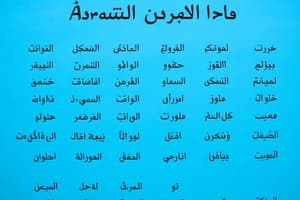Podcast
Questions and Answers
Which of the following options best demonstrates a nuanced understanding of noun-adjective agreement in Arabic when describing a 'broken window'?
Which of the following options best demonstrates a nuanced understanding of noun-adjective agreement in Arabic when describing a 'broken window'?
- an-nāfidhatu al-maksūratu (النافذة المكسورة) (correct)
- an-nāfidhatun al-maksūru (النافذة المكسور)
- an-nāfidhatun al-maksūratu (النافذة المكسورة)
- an-nāfidhatu al-maksūru (النافذة المكسور)
In a complex social scenario, such as offering assistance to a guest who has just arrived at your home, which of the following Arabic phrases most appropriately combines politeness and hospitality?
In a complex social scenario, such as offering assistance to a guest who has just arrived at your home, which of the following Arabic phrases most appropriately combines politeness and hospitality?
- sharāb min fadlik (شراب من فضلك)
- ta'ām huna (طعام هنا)
- tafaḍḍal, mādhā turīdūn (تفضل, ماذا تريدون؟)
- ahlan wa sahlan, mādhā tasha'ūn (أهلاً وسهلاً, ماذا تشاؤون؟) (correct)
Imagine you are at a formal dinner in an Arab country. How would you politely ask the waiter for water, keeping in mind cultural nuances of respect and formality?
Imagine you are at a formal dinner in an Arab country. How would you politely ask the waiter for water, keeping in mind cultural nuances of respect and formality?
- hal yumkinuka iḥḍār mā' min faḍlik (هل يمكنك إحضار ماء من فضلك؟) (correct)
- a'ṭinī mā' (أعطني ماء).
- ma' min faḍlik (ماء من فضلك).
- urīd mā' (أريد ماء).
You need to ask someone 'where is the closest hospital?' Which option is the most appropriate and grammatically correct way to ask this in Arabic?
You need to ask someone 'where is the closest hospital?' Which option is the most appropriate and grammatically correct way to ask this in Arabic?
Given that the Arabic number system reads from right to left, which sequence correctly represents the number 67 in Arabic numerals?
Given that the Arabic number system reads from right to left, which sequence correctly represents the number 67 in Arabic numerals?
Which of the following most accurately represents the use of the Arabic definite article 'al-' (ال) in a complex noun phrase, like 'the student's new book'?
Which of the following most accurately represents the use of the Arabic definite article 'al-' (ال) in a complex noun phrase, like 'the student's new book'?
How would you express 'I am very thirsty' in Arabic, using a phrase that emphasizes both the intensity of your thirst and politeness?
How would you express 'I am very thirsty' in Arabic, using a phrase that emphasizes both the intensity of your thirst and politeness?
When introducing yourself in a professional setting in Arabic, which of the following options is the most appropriate and formal way to state your name?
When introducing yourself in a professional setting in Arabic, which of the following options is the most appropriate and formal way to state your name?
If someone says 'tarḥib bik' (ترحيب بك), what is the most contextually appropriate response?
If someone says 'tarḥib bik' (ترحيب بك), what is the most contextually appropriate response?
You want to ask a classmate for help with your 'homework'. Which of these options is the most grammatically correct way to phrase your request in Arabic?
You want to ask a classmate for help with your 'homework'. Which of these options is the most grammatically correct way to phrase your request in Arabic?
Flashcards
Father in Arabic
Father in Arabic
The Arabic word for father is 'abū' (أبو).
Mother in Arabic
Mother in Arabic
The Arabic word for mother is 'ummu' (أمّ).
Hungry in Arabic
Hungry in Arabic
The word for hungry in Arabic is 'jā'i'' (جائع).
Water in Arabic
Water in Arabic
Signup and view all the flashcards
Teacher in Arabic
Teacher in Arabic
Signup and view all the flashcards
School in Arabic
School in Arabic
Signup and view all the flashcards
Hello in Arabic
Hello in Arabic
Signup and view all the flashcards
Goodbye in Arabic
Goodbye in Arabic
Signup and view all the flashcards
Boy in Arabic
Boy in Arabic
Signup and view all the flashcards
Home in Arabic
Home in Arabic
Signup and view all the flashcards
Study Notes
Key Vocabulary Areas
- Focus on everyday Arabic vocabulary, including greetings, introductions, and simple conversations. Crucial terms include those related to family, basic needs, and common objects.
- Master the conjugation of essential verbs in various tenses. Understanding verb forms is key to constructing grammatically correct sentences and expressing actions.
- Learn the gender and number agreement of nouns and adjectives. Proper usage of articles (al) is essential.
- Memorize Arabic numerals from 1 to 100, both written and spoken. Understand the differences between the Arabic and Western number systems.
- Memorize the names of the days and months of the year in Arabic.
Vocabulary Related to Family
- Father: abū / أبو
- Mother: ummu / أمّ
- Brother: akh / أخ
- Sister: ukhti / أخت
- Grandfather: jādd / جدّ
- Grandmother: jaddah / جدّة
- Son: ibn / ابن
- Daughter: bint / ابنة
Vocabulary Related to Basic Needs
- Water: mā' / ماء
- Food: ta'ām / طعام
- Drink: sharāb / شراب
- Hungry: jā'i' / جائع
- Thirsty: 'athīn / عطشان
Vocabulary Related to School and Education
- School: madrasah / مدرسة
- Teacher: mu'allim / معلم
- Book: kitaab / كتاب
- Student: talib / طالب
- Class: dar/ درس
- Homework: wājibeh / واجبة
Vocabulary Related to Places
- Home: bayt / بيت
- House: dar / دار
- Street: shāri' / شارع
- Market: suq / سوق
- Shop: mahabb / محل
- Restaurant: maṭaam / مطعم
- Hospital: mustashfa / مستشفى
Vocabulary Related to Greetings and Introductions
- Hello: salam/ السلام عليكم
- Goodbye: mā' is salaam/مع السلامة
- Please: min fadlik/من فضلك
- Thank you: shukran/ شكرا
- You're welcome: afwan/عفوا
- My name is...: ismi huwa.../ اسمي هو...
- Nice to meet you: tarḥib bi'ak / ترحيب بك
Vocabulary Specific to Edexcel Exam
- Identify and study frequently tested vocabulary and phrases from the Edexcel specification. Focus on example sentences and expressions relevant to question types.
- Focus on specific cultural contexts, such as historical or religious contexts, that are tested frequently.
Practical Application
- Practice using the vocabulary in various sentence structures.
- Create flashcards to aid in memorization.
- Engage in conversations with native speakers or language partners.
Studying That Suits You
Use AI to generate personalized quizzes and flashcards to suit your learning preferences.




